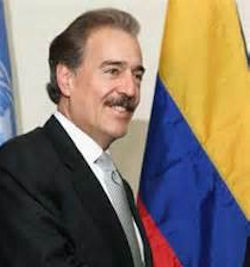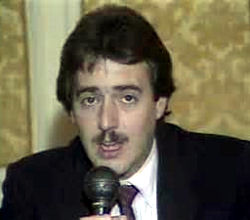Andres Pastrana (1998-2002)
 On August 7, 1998, Andres Pastrana became President of Colombia. A member of the Conservative Party, Pastrana defeated Liberal Party candidate Horacio Serpa in a run-off election marked by high voter turnout and little political unrest. During his administration, high unemployment, increased countrywide guerrilla attacks by the FARC and ELN, widespread drug production and the expansion of paramilitary groups all hindered the Pastrana administration's ability to solve the country's problems.
On August 7, 1998, Andres Pastrana became President of Colombia. A member of the Conservative Party, Pastrana defeated Liberal Party candidate Horacio Serpa in a run-off election marked by high voter turnout and little political unrest. During his administration, high unemployment, increased countrywide guerrilla attacks by the FARC and ELN, widespread drug production and the expansion of paramilitary groups all hindered the Pastrana administration's ability to solve the country's problems.
No single explanation fully addresses the deep roots of Colombia's present-day troubles, but they include limited government presence in large areas of the interior, the expansion of illicit drug cultivation, endemic violence, and social inequities. In order to confront these challenges, the Pastrana administration unveiled its "Plan Colombia" in late 1999, a comprehensive strategy to deal with these longstanding, mutually reinforcing problems. The main objectives of Plan Colombia are to promote peace, combat the narcotics industry, revive the Colombian economy, improve respect for human rights, and strengthen the democratic and social institutions of the country.
In November 1998, Pastrana ceded an area the size of Switzerland in south- central Colombia to the FARC's control as a goodwill gesture, but the rebels negotiated with the government only fitfully while continuing to mount attacks and expand their coca production, essentially establishing a parallel government in the region under their control. Negotiations with the rebels in 2000 and 2001 were marred by rebel attacks, kidnappings, and fighting between rebels and paramilitaries for control of coca-growing areas in Colombia. As a result, popular disenchantment with Pastrana increased.
In his last year in office, US President Bill Clinton was able to steer more than a billion dollars in US aid to Bogota to help shore up President Pastrana and his "Plan Colombia" national reconstruction program. But some Bush administration officials have voiced misgivings about concessions Mr. Pastrana has extended to guerrillas.
New life was breathed into Colombia's faltering peace process by President Andres Pastrana's OOctober 2001 decision to extend the term of a rebel sanctuary in southern Colombia. Pastrana said he based his decision on an agreement reached between the government and rebels. The nine-point accord between the government and the leftist Revolutionary Armed Forces of Colombia (FARC) came after two days of intensive talks held inside the rebel enclave in southern Colombia. Among the nine points, the FARC agreed to enter into immediate cease-fire talks and to halt roadside kidnappings. The government agreed to increase efforts to curb right-wing paramilitary groups.
In February 2002, after the FARC hijacked an airplane and kidnapped a senator, Pastrana ordered the military to attack rebel positions and reassert control over the rebel zone. FARC withdrew into the jungle and began attacks against the power grid, telecommunications facilities, and other aspects of Colombia's infrastructure in an attempt to disrupt the lives of the largely urban population while avoiding a direct conflict with the military.
Congressional elections held in March 2002 resulted in a triumph of sorts for the Partido Liberal (PL), which remained the majority party in both the Senate and the Representatives chambers but lost a significant number of seats to former PL members or independent candidates. Partido Social Conservador kept about the same number of seats in both chambers and is the second largest party.
Andres Pastrana by law cannot seek a second term. But, his failure to negotiate a peaceful settlement with leftist guerrillas helped one of his biggest critics become the front-runner in this election. Pastrana basically staked his entire political capital on the peace process and if it does not go forth, he did not really have anything else to show in terms of his government. All the leading Presidential candidates were quite vocal in criticizing Mr. Pastrana's policy toward the FARC.
 Pastrana is the son of a former President, Misael Pastrana, the last man to rule Colombia as part of a power-sharing arrangement between Liberals and Conservatives, which ended in 1974. He was born in Bogota and is married to Norha Puyana. The couple have three children, Santiago, Laura, and Valentina.
Pastrana is the son of a former President, Misael Pastrana, the last man to rule Colombia as part of a power-sharing arrangement between Liberals and Conservatives, which ended in 1974. He was born in Bogota and is married to Norha Puyana. The couple have three children, Santiago, Laura, and Valentina.
In the 1980's Mr. Pastrana, already widely known as a journalist on his family's television news program and later as a city councilman, turned down an offer to be named Mayor of Bogota by President Belisario Betancur. Instead he became the city's first popularly elected Mayor in 1988, and one of his achievements was significantly expanding the availability of drinking water in poor neighborhoods. He went on to become a Senator in 1991. Although Bogotanos do not remember Mr. Pastrana as an exceptional Mayor, even his critics note that Mr. Pastrana has never been accused of corruption or favoritism.
But at one time Andres Pastrana could not walk in public without facing a torrent of insults, the most frequent of which was "stoolpigeon." Pastrana was hounded by the wrath of fellow Colombians after he lost the previous presidential race to Ernesto Samper, then released recordings of Mr. Samper's campaign officials soliciting contributions from drug lords. Pastrana then found work consulting for the United Nations, and managed to stay out of the country for most of the next few years.
|
NEWSLETTER
|
|
Join the GlobalSecurity.org mailing list
|
|
|